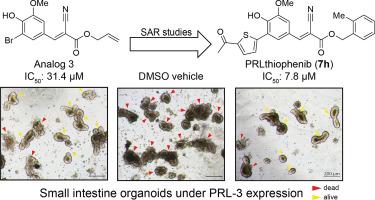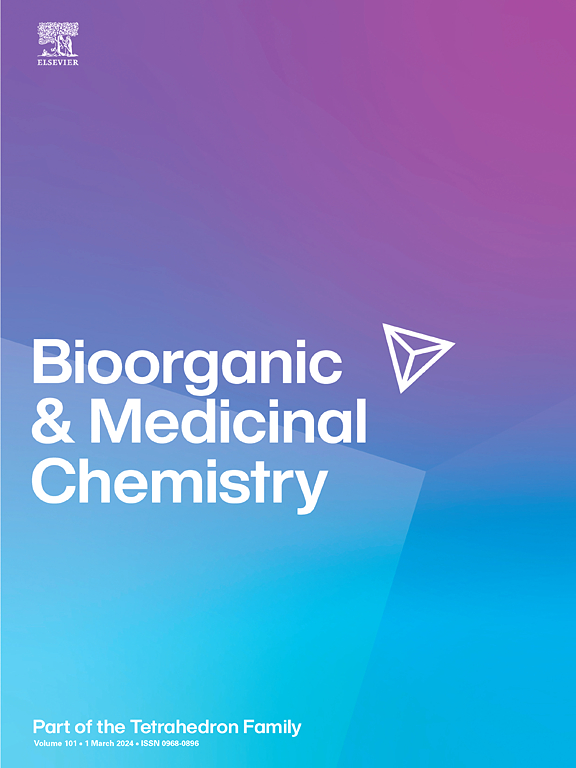促癌磷酸酶PRL-3抑制剂的发现及其在肠道类器官中的评价
IF 3
3区 医学
Q2 BIOCHEMISTRY & MOLECULAR BIOLOGY
引用次数: 0
摘要
再生肝磷酸酶(PRL)-3的上调与结直肠癌以及转移的发生和进展有关。PRL-3的过表达通过引起肠道干细胞死亡而损害肠道自我更新能力,这一肿瘤发生的细胞机制与PRL-3介导的炎症或突变事件对肿瘤形成的更高易感性相关。因此,PRL-3抑制剂有望成为癌症治疗的潜在治疗剂。基于PRL抑制剂Analog 3的结构,我们评估了两组重点小分子文库,并对其进行筛选,以确定更有效和选择性的PRL-3抑制剂。最好的药物PRLthiophenib在体外显示出比analogue 3更高的抑制效力,并且对PRL-3对其他蛋白酪氨酸磷酸酶(PTPs)的选择性有所提高,但在PRL家族中却没有,这仍然是一个挑战。PRLthiophenib具有高的细胞稳定性和无长期细胞毒性。此外,从过表达PRL-3的小鼠系衍生的可诱导的表达PRL-3的三维肠道细胞培养类器官系统,模拟了肠道自我更新能力的恢复。该结果将PRLthiophenib作为已发表抑制剂的补充抑制剂,并支持针对这种具有挑战性的促癌磷酸酶的治疗靶向药物发现工作。本文章由计算机程序翻译,如有差异,请以英文原文为准。

Discovery of inhibitors of the cancer-promoting phosphatase PRL-3 and their evaluation in intestinal organoids
Upregulation of the phosphatase of regenerating liver (PRL)-3 is associated with colorectal cancer as well as metastasis development and progression. PRL-3's overexpression impairs intestinal self-renewal capacity through causing intestinal stem cell death, correlating this cellular mechanism of tumor onset with PRL-3-mediated higher susceptibility to tumor formation upon inflammatory or mutational events. Therefore, PRL-3 inhibitors hold promise as potential therapeutic agents for cancer treatment. Based on the structure of the PRL inhibitor Analog 3, we evaluated here two sets of focused small molecule libraries and screened them in order to identify more potent and selective PRL-3 inhibitors. The best hit, named PRLthiophenib, showed higher inhibition potency in vitro than Analog 3 with improved selectivity for PRL-3 over other protein tyrosine phosphatases (PTPs), but not within the PRL family, which continues to be a challenge. PRLthiophenib presented high cellular stability and no long-term cytotoxicity. Furthermore, it rescued the growth capacity of an inducible PRL-3-expressing three-dimensional intestinal cell culture organoid system derived from a PRL-3 overexpressing mouse line, mimicking the rescue of intestinal self-renewal capacity. The results introduce PRLthiophenib as a complementary inhibitor to published ones and support drug discovery efforts toward therapeutic targeting of this challenging cancer-promoting phosphatase.
求助全文
通过发布文献求助,成功后即可免费获取论文全文。
去求助
来源期刊

Bioorganic & Medicinal Chemistry
医学-生化与分子生物学
CiteScore
6.80
自引率
2.90%
发文量
413
审稿时长
17 days
期刊介绍:
Bioorganic & Medicinal Chemistry provides an international forum for the publication of full original research papers and critical reviews on molecular interactions in key biological targets such as receptors, channels, enzymes, nucleotides, lipids and saccharides.
The aim of the journal is to promote a better understanding at the molecular level of life processes, and living organisms, as well as the interaction of these with chemical agents. A special feature will be that colour illustrations will be reproduced at no charge to the author, provided that the Editor agrees that colour is essential to the information content of the illustration in question.
 求助内容:
求助内容: 应助结果提醒方式:
应助结果提醒方式:


